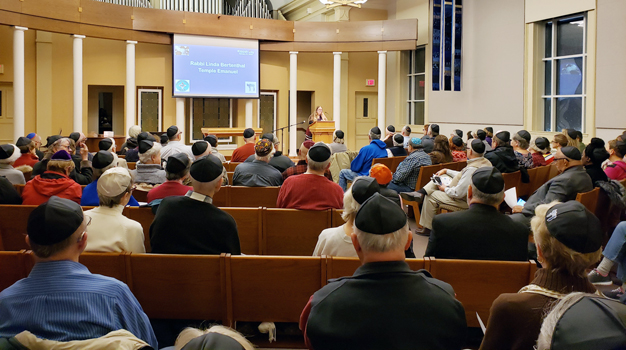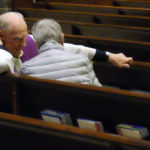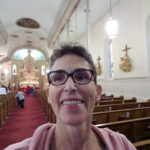
Participants listen to Rabbi Linda Bertenthal Jan. 30 at St. Paul Lutheran Church in Davenport during a service to prepare for Kippah Day on Jan. 31, a day to show unity with people of the Jewish faith. Each participant wore a kippa, a brimless hat, worn by Jewish people.
By Barb Arland-Fye
The Catholic Messenger
Catholics from the Diocese of Davenport were among numerous people who wore a brimless hat called a “kippah” as they went about their daily activities Jan. 31 to show unity with people of the Jewish faith. Escalating anti-Semitism in the United States prompted One Human Family of the Quad Cities to organize “Kippah Day” to send a message that hate is not welcome here.
The unity effort began Jan. 30, when St. Paul Lutheran Church in Davenport hosted an event at which people picked up a free kippah and stayed for a short program about Kippah Day. Organizers invited the attendees to participate in a regularly scheduled service at Temple Emanuel in Davenport to conclude their show of solidarity on Jan. 31.
Anti-Semitism incidents in the U.S. had been declining until 2014 when that trend began to reverse, Rabbi Linda Bertenthal of Temple Emanuel told the gathering at St. Paul Lutheran. “In 2017, the total number of incidents jumped by 57% over 2016, the largest increase since tracking began in the 1970s, reaching nearly 2,000 incidents.”
Deadly incidents of anti-Semitism have raised Jewish people’s security consciousness to the level of fear, she said. “Within less than two years, we have had the October 2018 Pittsburgh synagogue shooting, the deadliest anti-Semitic attack in U.S. history; the April 2019 San Diego synagogue shooting; and the December 2019 kosher market shooting, a shocking increase in anti-Semitic murder.”
In the final month of 2019, 41 anti-Semitic incidents were reported in the U.S.; 19 of them were violent and two were deadly. “The Jewish community feels more vulnerable than it has in several generations,” Rabbi Bertenthal said. “In fact, the parents of my religious school were alarmed to see publicity of the Kippah Day invitation to attend services at my temple tomorrow evening, lest a shooter be attracted to come and murder their children who are helping to lead the service. They asked me to hire a second police officer for the service.”
Anti-Semitism is lower in the Midwest. However, even in the Quad Cities, “we are not completely immune. A hate group called the National Alliance is spreading their fear-mongering hate literature right here, on both sides of the river,” the rabbi said. “So you cannot imagine how grateful I am that you are reaching out to say, ‘Not in the Quad Cities.’”
The Rev. Peter Pettit of St. Paul Lutheran Church reflected on the significance of wearing the kippah. First, it generates “our understanding of the experience of those for whom the kippah has begun to feel like a target. That means we are looking to feel discomfort… of the questions it will arouse, the odd looks we may get, the explanations we will have to offer, perhaps even an abusive comment or gesture.”
For Christians, “moving toward that discomfort is a reminder of the incarnation. It recalls that none other than God moved toward us, personally experienced our suffering and pain and even death. God moved toward us to know fully and feel fully what it is to live as the creature, not just the Creator.”
Wearing the kippah alongside a Jew “becomes my way of affirming that fullness of human value and dignity. Does the kippah offend the bigot? Then the kippah must be what I embrace to counteract the bigot. Only when all who wear the kippah are recognized in their full humanity can I count my humanity also as full. Wearing it becomes a witness, a way of making the statement, that we are all equals.”
Finally, when a kippah sits on one’s head, it “symbolizes the depth of our interrelationship as neighbors, citizens, children of God, human beings,” Rev. Pettit said. “Welcome to Kippah Day.”
The Rev. Rogers Kirk, pastor of Third Missionary Baptist Church in Davenport, invoked the name of civil rights leader, the Rev. Martin Luther King., Jr., who preached that the only way to overcome hatred is with love. Rev. Kirk cited a passage from First John about reciprocating God’s love by showing love to one another. “We’ve watered down the word love,” he said. “I love my shoes … I love Snickers bars” (the congregation laughed). Then he cited the well-known passage from First Corinthians about love. “To overcome hate,” Rev. Kirk said, “is to love.”
Lisa Killinger, president of the Muslim Community of the Quad Cities, described a tapestry of faith and culture woven together. What affects one affects all, she said. “We are one human family,” a phrase she asked the audience to repeat.
“When we stand up and speak out, we are at our best … our unity in this makes us invincible,” Killinger said. “Unity is our only way forward.”











